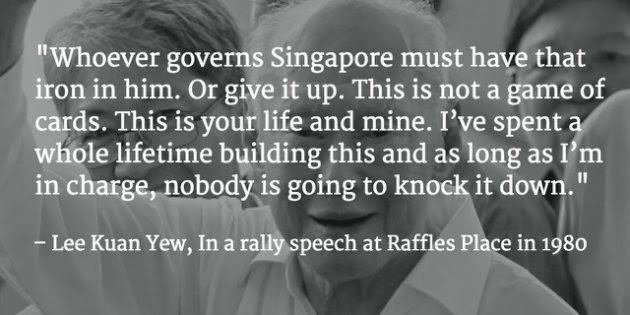And while there were tears, outpouring of love and respect, and back-to-back documentaries of the man who built this nation, there were also many eloquent articles that surfaced all over the Web as Singaporeans begin to emerge from their shell of apathy to reexamine what it means to be Singaporean and reassess their view of their first Prime Minister.
Here are 10 notable articles that struck a chord with me:
1. Calvin Cheng's defence of the Singaporean model of governance
2. Bertha Henson's candid account of her encounters with Mr Lee
3. Lili Tan's pensive musing on death and how it unites the living
4. Deborah Tan's heartfelt letter to Mr Lee that made me cry
5. Steph Leong's well-researched article on Mr Lee and his policies
6. Prime Minister Lee Hsien Loong's interview with Today newspaper, in which he shared insights on the man we all thought we knew
7. Jaime Ee's reflections on the surge of patriotic fervour that has arisen these past few days in the wake of Mr Lee's passing
8. A taxi driver's informal tribute to Mr Lee, as recounted by Tiffany Joyce Lim
9. Sahana Singh's comparison of the Western ideal of personal freedom versus the Asian notion of community before self, and argues how much better off we are for sacrificing some personal freedom for the greater good.
10. A reflection on the past week of mourning that perfectly encapsulates all the reasons for our profound sorrow at Mr Lee's passing.
And here were some of the ways we immortalised him,
At the Istana:
On the way to pay our last respects to him:
 |
| photo by Chen Zhirong |
At community centres all over the country:
At the National Library:
And the ways the outside world honoured him,
In Time magazine:
In the words of foreign dignitaries,
And their physical presence:
 |
| Former U.S. president Bill Clinton |
 |
| The Bhutan king |
 |
| Former U.S. Secretary of State Henry Kissinger |
 |
| Japanese Prime Minister Shinzo Abe |
 |
| Sultan of Brunei |
And finally, this video that shows just how larger than life, yet human, Mr Lee Kuan Yew was (please get your tissues ready):
Yesterday, we sent Mr Lee off on his final journey.
Throngs of people gathered around the Parliament House and lined the funeral procession route to send Mr Lee off. Even the clouds hung low that day, and the downpour marked the climactic end to a great legacy. People wept for him, as did the skies.
I will never forget the day I waved my flag in the pouring rain and caught my first and only glimpse of Mr Lee, the day I broke down in public with my fellow Singaporeans as I whispered a word of thanks that I hoped he could hear.
At 4:35PM, we bowed our heads for a minute of silence, saying our final goodbye to the man who changed all our lives for the better.
Words can't express how much gratitude, respect, and love I have for this man who was iron-willed enough to do what needed to be done to bring a tumultuous fledgling nation to its current state; who was never complacent and always sought ways to improve; who took no bullshit from detractors and opponents, but was always kind and protective of us, the citizens; who was so devoted to his country so much he made it his lifelong project and saw it through till his final days.
So we've lost him at last. Indomitable as he seemed, he was, after all, human, and no man - no matter how noble or gifted - can live forever. But perhaps we should also be thankful for the fact that we had lived in a time when a great, fearless leader by the name of Lee Kuan Yew was around to pave the way for us to venture another step forward.
Rest now, Mr Lee. We will continue writing the Singapore story for you. You will live forever in the hearts of your people, and be dearly missed.





















